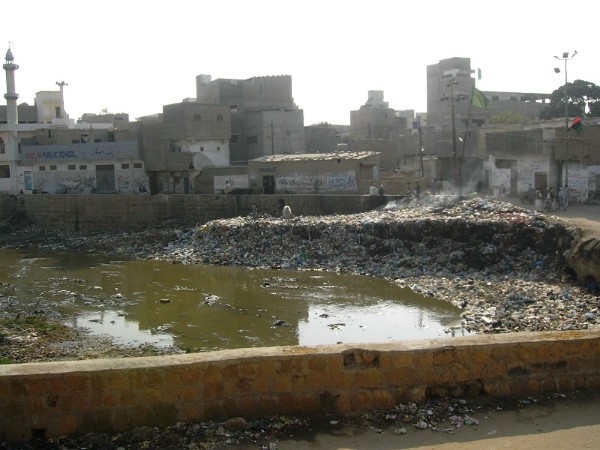Global Engineering Congress – world’s engineers to agree urgent action on clean water and sanitation
- December 6, 2018
- Posted by: administrator
- Category: Conferences, Global

Waste rubbish water pollution in Karachi, pakistan
Over 2,000 engineers and policymakers from more than 150 countries are due to meet in London from 22nd October to agree a worldwide response to deliver the UN Sustainable Development Goals (SDGs), including action on clean water and sanitation.
The first Global Engineering Congress (GEC), to be held in Westminster for five days from the 22nd October 2018, is a joint effort by the World Federation of Engineering Organisations (WFEO) and the Institution of Civil Engineers (ICE) to spur practical action on climate change, clean water, clean energy, innovation,infrastructure and sustainable cities.
A key outcome will be a route-map with detailed commitments and actions for the global engineering community to progress the SDGs over the next three years.
Explaining the need for GEC, Professor Lord Mair, ICE President, said:
“We cannot be complacent about the need for escalated efforts on sustainable development. The planet is changing faster than we are currently adapting, and progress is not reaching those who most need it.
“It is not acceptable that in 2018, one billion people are still without electricity and more than twice that number are without basic sanitation. Everyone deserves safe housing, clean energy and water, and an environment worth living in, and these are areas where civil engineers can and do make a real difference.”
GEC will feature over 100 speakers, with keynote presentations including
- Sir John Armitt, Chairman of the UK National Infrastructure Commission
- Miguel Clüsener-Godt, Director, Ecological and Earth Science Division, UNESCO
- Nick O’Regan, Director of Infrastructure and Project Management, United Nations Office for Project Services (UNOPS)
- Jordan Schwartz, Director for Infrastructure, Public Private Partner and Guarantees, The World Bank

The programme will feature a dedicated stream of talks and workshops on water and sanitation, including sessions on global approaches to water for sustainable development, changing approaches to sanitation and hygiene, collecting and treating wastewater in low economy countries, and balancing availability and affordability of water.
Speakers will include:
- Roger Bailey, Asset Management Director, Tideway;
- Peter Grevatt, Director of the Office of Ground Water and Drinking Water, US Environmental Protection Agency;
- HakanTropp, Head of Water Governance Programme, OECD.
UN expert says achieving SDG6 on water & sanitation essential for progress on all other SDGs
Earlier this year, the Institution of Civil Engineers heard from Professor Stefan Uhlenbrook, Director of UNESCO Programme Office for Global Water Assessment and Coordinator of the Annual United Nations World Water Development Report.
Delivering the 2018 Gerald Lacey memorial lecture, he presented findings from the UN’s evidence-based review to establish the global baseline status of UN Sustainable Development Goal 6 – ensure availability and sustainable management of water and sanitation.
Underlining the need for GEC, Professor Uhlenbrook emphasised that now is the time to act on SDG 6 and that achieving this goal is essential for progress on all other SDGs, posing a huge challenge for civil engineers.
Water should be understood as the key enabler of all the other SDGs. Investment in water and sanitation, he said, has a five-fold increase on a country’s economic development (e.g. increased school attendance, health and productivity) so there should be far more investment in meeting SDG6.
Image: water supply for San Tong village, China

Throughout the lecture, Professor Uhlenbrook presented maps indicating global performance on the critical key performance indicators (KPIs) for water. These showed the stark differences between different countries and the huge challenges that remain. 2.1 billion people lacking safely managed drinking water. 844 million people still lack a basic service (access to drinking water within 30 metres of their home) while 263 million people use a limited service. The newest research also shows significant subnational inequalities in basic drinking water services.
Meanwhile, 4.5 billion people lack safely managed sanitation services and over 2.3 billion people still lack basic sanitation services. 892 million people still practise open defecation and the world is not on track to end open defecation by 2030. Only 27 per cent of the population in Least Developed Countries (LDCs) has access to soap and water for handwashing on premises.
Through GEC, ICE is helping civil engineers to understand the role they can and should play in tackling these challenges. Over the next three years, ICE will work with like-minded partners from across the world on an engineering sustainable development route-map. The input from congress delegates will help to set out a pathway for the whole engineering community to enable economic success while delivering benefits for society and the environment.
Professor Lord Mair said:
“With a changing climate and a growing global population, the challenge is only intensifying. At GEC, I want to see the entire engineering community unite behind a single vision of how we can drive change.”
Limited tickets are still available for Thursday 25th and Friday 26th October at GEC. Find out more and book your place: https://www.ice.org.uk/events/global-engineering-congress
